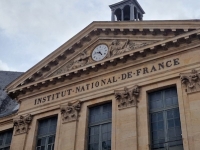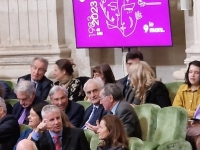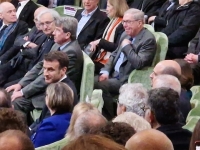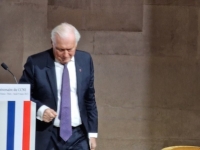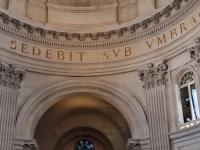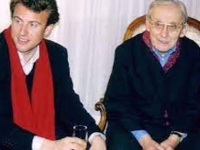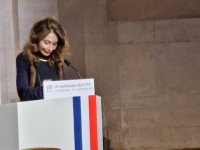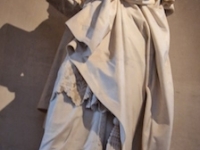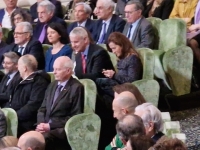Health
PRES. MACRON COMMEMORATES 40TH ANNIVERSARY OF NATIONAL ETHICS COMMITTEE
AT INSTITUTE OF FRANCE
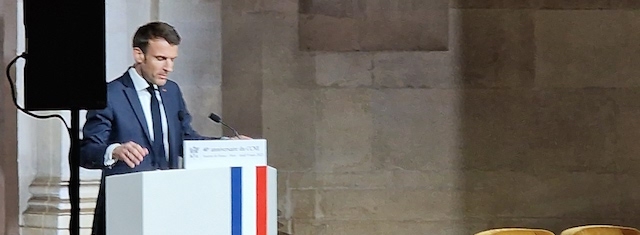
Pres. Macron Institute of France Speech (Source: Jedi Foster & RSR)
USPA NEWS -
The President of the French Republic, Emmanuel Macron, chaired over the closing of the 40th anniversary of the National Consultative Ethics Committee for Life and Health Sciences (NCEC), on Thursday March 9, 2023, at the Institut de France. "It is an honor for me to celebrate among you today these 40 glorious years of the NCEC and to thank you, members of yesterday and today, for having each brought your stone to this building and for to do here at the Institut de France, whose importance and history you have recalled. And you have collectively written on its pediment these two words science and conscience which, for the good of our country, should never be separated." Said explains President Macron, by way of introduction to him who studied philosophy at the University of Nanterre, before embarking on politics.
"This institution, the first in the world to have this mission, this composition, this functioning, has become an example that has been emulated. Other countries soon followed suit and I know that you regularly hold meetings with the ethics committees of England and Germany, whose structure is closest to ours, and even once a year with all of your European equivalents.
"This institution, the first in the world to have this mission, this composition, this functioning, has become an example that has been emulated. Other countries soon followed suit and I know that you regularly hold meetings with the ethics committees of England and Germany, whose structure is closest to ours, and even once a year with all of your European equivalents.
"The President of the French Republic, Emmanuel Macron, presided over the closing of the 40th anniversary of the National Consultative Ethics Committee for Life and Health Sciences (NCEC), on Thursday March 9, 2023, at the Institut de France. "It is an honor for me to celebrate among you today these 40 glorious years of the NCEC and to thank you, members of yesterday and today, for having each brought your stone to this building and for to do here at the Institut de France, whose importance and history you have recalled. And you have collectively written on its pediment these two words science and conscience which, for the good of our country, should never be separated." Said explains President Macron, by way of introduction to him who studied philosophy at the University of Nanterre, before embarking on politics.
"This institution, the first in the world to have this mission, this composition, this functioning, has become an example that has been emulated. Other countries soon followed suit and I know that you regularly hold meetings with the ethics committees of England and Germany, whose structure is closest to ours, and even once a year with all of your European equivalents, bringing this dialogue of consciences of which you were the first speakers. thus explained President Macron, proud to celebrate the 04th anniversary of this institution, known and recognized by its peers, and whose notoriety has crossed borders, as a know-how and literary knowledge and carried by the philosophical thoughts of enlightenment.
This Ethics committee became French flagship "With this spirit of self-criticism, which does honor to that of the Enlightenment with this capacity for doubts, which is sometimes a flaw for some, he often believes himself to be a strength of France and which is here a raison d'être, reimagined, weighed, preceded, weighed, questioned our major decisions, guided them in the light of our values. Fundamentally rewriting ethics in the age of technical civilization. The place where we are celebrating this anniversary, this institute of France which was once the College of the Four Nations, which has always been a place of exchange and enrichment, is basically a good metaphor for this." Thus proclaimed President Macron,
"After an introduction by Professor Delfraissy, the Head of State Macron continued "The founding of the NCEC was the consequence, as you said, in any case, the pretext was found with the first French baby conceived by in vitro fertilization But there was indeed for several years, big in the public debate and the intellectual reflection, the need to be able to cross this course." It was founded on February 23, 1983 by President François Mitterrand of the time, during the design of the first test tube baby Amandine
"Since April 2022, as you mentioned, six members come from associations to further diversify this plurality of perspectives which ensures your complementarity with the political decision-making bodies. This is why I am as attached as you to your independence to to offer government in the making and review of these laws, a guide in 1994, 2004, 2011, 2021." explained President Macron,
The NCEC was the first National Ethics Committee created in the world and reflects the spirit of philosophers and lights, symbols of France, and which was the pioneer, in the reflection of ethics and bioethics, taken up by many European and Anglo-Saxon nations.
The NCEC was the first National Ethics Committee created in the world and reflects the spirit of philosophers and lights, symbols of France, and which was the pioneer, in the reflection of ethics and bioethics, taken up by many European and Anglo-Saxon nations.
Today an independent institution, its mission is to carry out ethical reflection and to enlighten decision-makers and public action. It also informs and sensitizes society to the challenges brought about by scientific advances: bioethics, genetics, medical assistance and the links between human health and the environment.
On the occasion of this visit, the Head of State thanked its President, Professor Jean-François Delfraissy, and the members of the Committee for their constant involvement, which had contributed to making NCEC a major institution in the country. He will also recall the essential role of the Committee during the COVID-19 pandemic, or even on the very touching subject of end of life and euthanasia, and Assistive Reproduction.
PRESIDENT MACRON ANNOUNCED THE CONTINUATION OF THE DIGITAL ETHICS COMMITTEE, CREATED IN 2019
"For several years, the irruption of digital technology in our daily lives has also become a new spur, and not the least, of our thinking. How can we talk about health ethics without talking about health data, their sharing, their use, their conservation, the possibility or not of using it for purposes other than strictly scientific, the clarity of the framework in which these health data are used, the growing role of computers in the care process , from the development of exoskeletons to improved prostheses. The passage from tools to machines that Hannah Arendt described as a fundamental break in the history of humanity. In a way, doubled by the passage from machines to machines. 'artificial intelligence." thus explained President Macron by recalling the contribution of the human sciences and philosophy to answering ethical questions, with respect to assistive technology in our modern lives, and in particular the A.I…./
"For several years, the irruption of digital technology in our daily lives has also become a new spur, and not the least, of our thinking. How can we talk about health ethics without talking about health data, their sharing, their use, their conservation, the possibility or not of using it for purposes other than strictly scientific, the clarity of the framework in which these health data are used, the growing role of computers in the care process , from the development of exoskeletons to improved prostheses. The passage from tools to machines that Hannah Arendt described as a fundamental break in the history of humanity. In a way, doubled by the passage from machines to machines. 'artificial intelligence." thus explained President Macron by recalling the contribution of the human sciences and philosophy to answering ethical questions, with respect to assistive technology in our modern lives, and in particular the A.I…./
PRESIDENT MACRON PAID TRIBUTE TO FORMER PRESIDENT MITTERRAND AND THE FIRST MANAGERS PHILIPPE LAZAR AND JEAN BERNARD PIONEERS OF CCNE
“The inspired vision of François Mitterrand, the work of these first two master builders, Philippe Lazar and Jean Bernard, had laid a solid foundation. I, in turn, want to pay tribute to the line of presidents of the National Consultative Ethics Committee who have resumed and amplified their efforts Jean-Pierre Changeux, Didier Sicard, Alain Grimfeld, Jean-Claude Ameisen, some of whom are here with us today. today. Without forgetting, of course, Jean-François Delfraissy, who has been our talented project manager for more than 6 years, to whom I would like to express particular gratitude for the fruitful dialogue that we have established within the framework of your work and in some other responsibilities that may have been entrusted to you.
PRESIDENT MACRON QUOTES HIS MENTOR PROFESSOR PAUL RICOEUR
President Macron, quoted Paul Ricoeur, the historian/philosopher who was his mentor and professor of philosophy. In effect,
Emmanuel Macron had first studied politics at Sciences Po and at the National School of Administration (ENA) but also at the University of Nanterre (Few miles from Paris) between 1999 and 2001 and obtained a master's degree in 2000 and a DEA in 2001. During his schooling, he became the editorial assistant of the philosopher Paul Ricoeur, co-founder and former dean of the University of Nanterre in the 1960s, whose influence he did not claim. This certainly explains why Emmanuel Macro so often evokes civilizational and existential questions, within the framework of his function as President of the Republic.
"Yes. It is your legitimacy. Dare I quote the man who was the master of many in this room, Paul Ricoeur, "I have authority because I have read more books". who are yours, it turns out that those who are chosen are also chosen because they have read more books, have a practice, precisely have knowledge recognized by their peers which justifies a scientific, academic authority and therefore talk about a place with skills that are not the same as in the rest of society.
The President of the French Republic also highlighted the work carried out by the Pilot National Committee for Digital Ethics launched in December 2019 by the Government, which offers in-depth reflection on the many challenges of the sector. "Since April 2022, as you mentioned, six members come from associations to further diversify this plurality of perspectives which ensures your complementarity with the political decision-making bodies. This is why I am as attached as you to your independence to to offer government in the making and review of these laws, a guide in 1994, 2004, 2011, 2021." Explained President Macron.
Liability for this article lies with the author, who also holds the copyright. Editorial content from USPA may be quoted on other websites as long as the quote comprises no more than 5% of the entire text, is marked as such and the source is named (via hyperlink).

